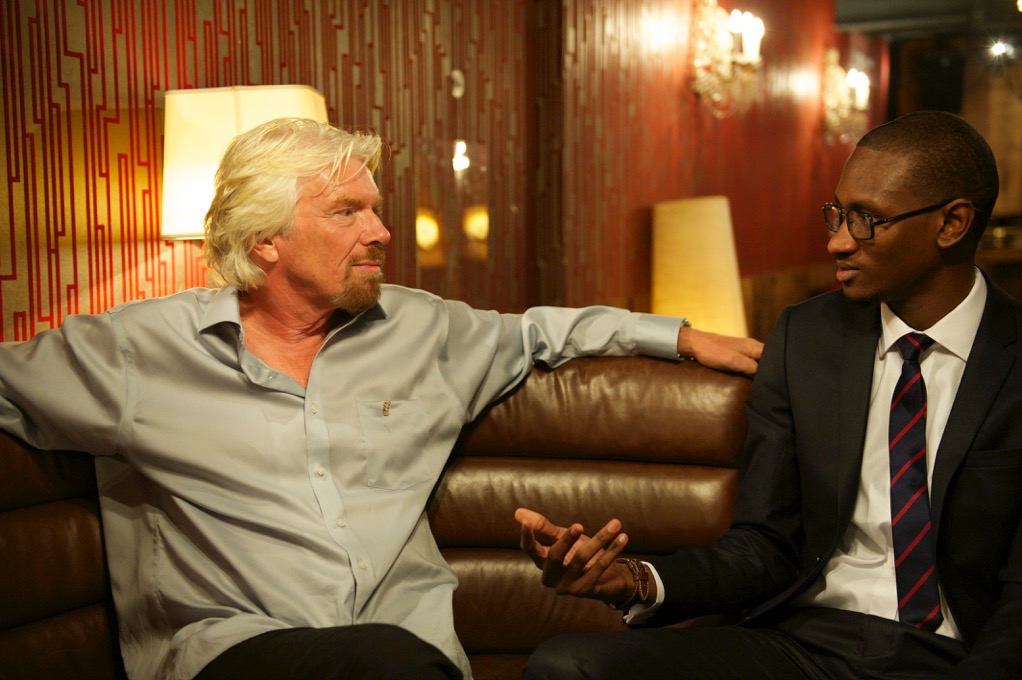In July 2014, I met Sir Richard Branson for the first time in a Shoreditch restaurant called ‘Beach Blanket Babylon’ in London.
I was one of the winners of the Enterprise Challenge, a Dragon’s Den-style competition backed by Virgin Atlantic and the British Council. We were ‘young entrepreneurs who Richard Branson believed were stars in the making – rich in talent and ripe with innovation’.
We were to have a masterclass with him and the whole place was set for it; from the media personnel to Virgin Atlantic, British Council executives and the press. As you’d imagine, the busy restaurant was shut down for us. After our remarkable Masterclass, I joined Richard in an extravagant party into the evening, graced by some of London’s biggest names to launch new Virgin Atlantic uniforms designed by world famed fashionista, Vivienne Westwood. In all the evening’s pomp, no one could have imagined that six years later a global pandemic will lead to the bankruptcy of the mega airline.
One of the biggest adverse impacts of the ongoing COVID-19 pandemic is the almost complete shutdown of the global passenger aviation industry, which occasioned the going into ‘administration’ or bankruptcy of many airlines, including Virgin Atlantic. This sparked many a media frenzy especially about the net-worth of the billionaire founder of the airlines and Virgin Group Chairman, Sir Richard Branson. I read his explanation, detailing how his net worth is “calculated on the value of Virgin businesses around the world before this crisis, not sitting as cash in a bank account ready to withdraw” and how “significant profits have never been taken out of the Virgin Group, instead they have been reinvested in building businesses that create value and opportunities” amidst other reasons why his airlines needed bailouts.
It was intriguing to see how the pandemic took its toll on all entrepreneurs, big or small, and all businesses irrespective of geography or size. You could be a small time travel agency in Kano or a multinational airline in New York and you still have to grapple with the same existential questions facing your industry. This took me down memory lane on the lessons I learned from Sir Richard Branson when I met him as a student and aspiring entrepreneur six years ago. Lessons new entrepreneurs and old alike might find useful, especially relevant now as resilience and survival are essential and starting up is in a ‘new normal’.
1. Take notes, relentlessly
At the time we met in 2014, I was a Master’s student in London with a burning question; how was Richard able to build so many successful companies and the Virgin brand? I asked for a cheat sheet, the one underlying principle, factor, or action. Surprisingly, Richard attributed a lot of his achievement to his relentless note taking. He’d note down an idea no matter how simple or complex. He’d make a list of goals to achieve, and diligently cross them off. He had a notebook wherever he went.
“Some of Virgin’s most successful companies have been born from random moments – if we hadn’t opened our notebooks, they would never have happened,” he said. However, “Don’t just take notes for the sake of taking notes; go through your ideas and turn them into actionable and measurable goals.”
2. Success is a mixture of hopeless optimism and extreme dedication
Later that year, I attended the Branson Centre for Entrepreneurship in Braamfontein, Johannesburg, to learn entrepreneurship the Virgin way. One of the first things that stick to your head as a visitor in the centre is the motto: ‘Screw it, Let’s do it’.
Virgin has been a strong proponent of this mentality for over four decades; seizing opportunities and building over 400 businesses. All because Richard Branson is your ultimate YES Man. He famously said “If somebody offers you an amazing opportunity but you are not sure you can do it, say yes – then learn how to do it later!”
Richard is perhaps one of the only entrepreneurs to have built hundreds of successful enterprises in their lifetime. According to Richard, when you’re focused on a dream, you strive to create opportunities or turn any opportunity into the right opportunity. “We should use every opportunity that comes our way as a step towards achieving our dreams,” he said.
3. Failure is part of the DNA of every successful entrepreneur
On 1st November, 2014, I watched Richard on TV at the Mojave Desert, observing the wreckage of Virgin Galactic’s SpaceShipTwo which crashed, killing one pilot and severely injuring the other, casting huge doubts on Virgin’s Space Tourism programme. Questioned about the status of the mission after this fatal crash, Richard said, “Yesterday we fell short, we’ll now comprehensively assess the results of the crash and are determined to learn from this and move forward.”
Richard constantly harps on the necessity of trying out new things and often failing in order to innovate. He has, in the course of the last 50 years, faced numerous failures but has also been brazen in the face of setbacks. “Making mistakes and experiencing setbacks is part of the DNA of every successful entrepreneur, and I am no exception,” he said.
Virgin Pulse and Virgin Digital were companies that failed in the same market where the iPod and iTunes flourished tremendously. There were once Virgin Megastores, Virgin Clothing, Virgin Cola and even Virgin Cars. These and many earlier failures have only strengthened Richard and prepared the Virgin Group for grander visions.

 Join Daily Trust WhatsApp Community For Quick Access To News and Happenings Around You.
Join Daily Trust WhatsApp Community For Quick Access To News and Happenings Around You.
